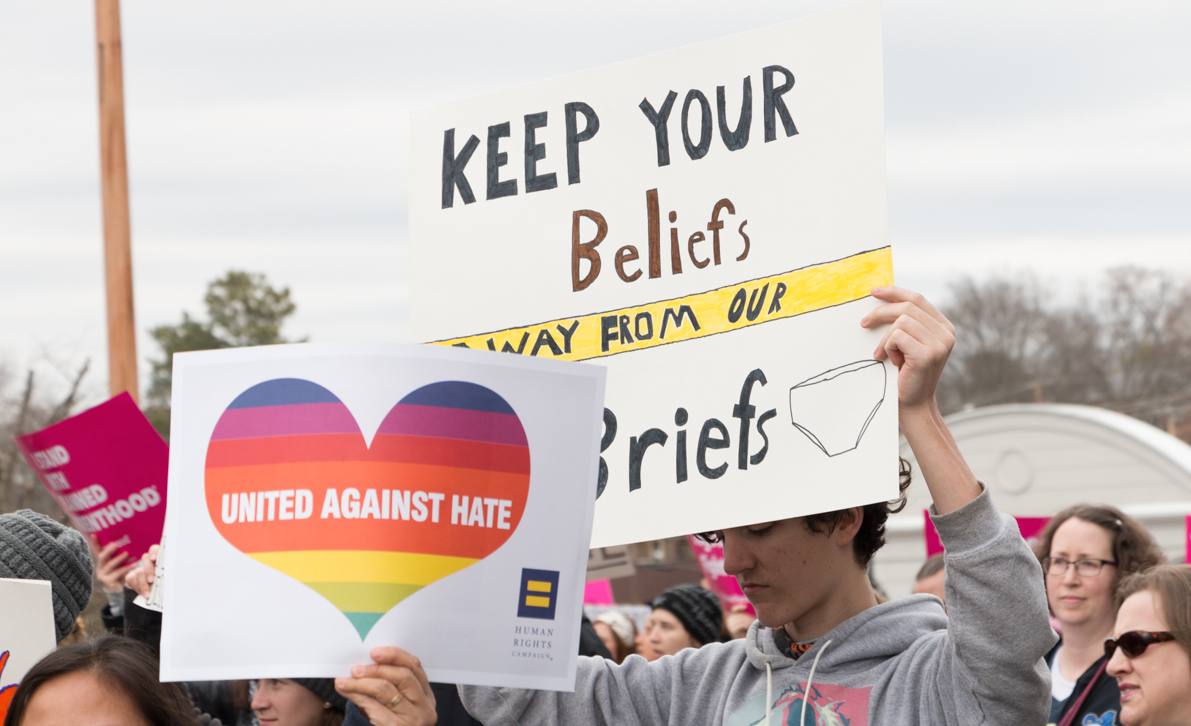As a cis woman, I have historically viewed my reproductive rights from a white, Western narrative in which I had been sold the idea that equality means access to safe abortion. I would not hear the thousands of stories belonging to marginalized people that came before or since Roe v Wade or the Morgentaler decision. I have since learned that reproductive justice encompasses more than the freedom to choose. It is intertwined with the right to move freely in society. There is clear evidence to support the concept that reproductive justice will only be fully realized when the rights of the queer community are advanced and secured.
A friend of mine (whom I will refer to as Tao) had been suffering from acne their entire life. Several years ago, they were booked to see a dermatologist. The acne had caused scarring, bleeding, and infection. This painful condition had consumed their life and no cream or diet could remedy the situation. On this particular day, I agreed to come along for moral support and a bribe of a latte. It was expected that the medication Accutane would be the last viable option for Tao and a quick prescription would do the trick.
Upon entering the dermatologist’s clinic, we encountered an immediate barrier to care. Tao, who is transgender and non-binary, was accosted by the receptionist who proclaimed: “I refuse to use your pronouns or legal name! You are the gender that I say that you are!” Had my friend not had legal identification with their X gender marker listed, they could have been denied access to this appointment simply due to this discriminatory receptionist. This is not uncommon — the Trans PULSE Project found that 40 per cent of trans people in Ontario with a family doctor had been discriminated against by their doctor at least once, including refusal of care or the refusal to examine specific body parts.
Once we made it past the peeling beige paint and a sign that read “Abuse will not be tolerated!” I was hopeful that we had graduated to a more professional level of care and could leave quickly with the medication in our hands. What we discovered next could have taken place in the year in which this doctor was apparently born.
After taking clinical note of the severe acne and extensive scarring, the doctor suggested that Accutane would be the most effective treatment. However, prior to providing this prescription, the doctor wanted to discuss Tao’s gender. Gender usually takes the front seat of any medical interaction for Tao, however small or large. After a brief discussion regarding gender, the doctor asked Tao if they were sexually active because he had concerns regarding fetal development while taking Accutane. Tao advised the doctor that they were taking high doses of testosterone, as evident on their health record and recent lab values, rendering pregnancy impossible. It is well established that testosterone, among other hormones, has been used as effective birth control regardless of sex. The Standards of Care for Transsexual, Transgender, and Gender Nonconforming People, first written in 1979 by the World Professional Association for Transgender Health, outlines hormone therapy and its effect on infertility.
Unmoved by science, the doctor continued to express worry and grief over a fetus that did not exist. The doctor advised Tao to take estrogen for six months, at which time he would reconsider prescribing Accutane. This would effectively destroy Tao’s actual existence, place them at risk of severe health complications, and do certain harm to their body. Even after Tao explained that their current medication list would compromise fetal development even without Accutane, the doctor still refused to treat Tao, leaving them in severe daily pain.
The last and possibly most disturbing factor in this exchange was the dismissal of Tao’s self-reported abstinence status. This doctor did not care that there was zero risk to a developing fetus because he did not see a patient, only a uterus. It was at this point that I understood something: reproductive rights are about the right to autonomy, for all genders.
We left without a prescription but did return three more times with letters from endocrinologists and medical doctors (who had opted in for the reproductive rights portion of medical training — yes, this training is optional and not mandatory), to no avail. The physician had prescribed Accutane to other patients, including cis women, without forcing them to take additional medication against their will or sign a sex contract. Tao’s experience made it clear to me that reproductive rights will not be fully realized until the autonomy of transgender folks is respected. It is here that we decide how much a uterus is valued over the entire body. Only when people can govern their own bodies on their own terms, independently of procreation, can we ever say that reproductive justice is designed to protect all persons living autonomously.
Cis women, if you want equality and reproductive rights, rally beside the transgender community and fight for their right to govern their own bodies. If we treat reproductive rights as a “female” issue only, we will perpetuate the same judgements that have kept us in a holding pattern of determining who deserves access to these rights.
Shari-Lynn Dueck is a Canadian and former public servant with the several years experience in law enforcement, education, and health care. Once a Phi Theta Kappa Chapter Officer, their formal education and achievements involve systems design and cyber security certification. They are dedicated to advocacy, service and learning, and believe that progression of human rights does not require understanding, it requires acceptance in the form of action.
Photo: Bob Simmons/Flickr




